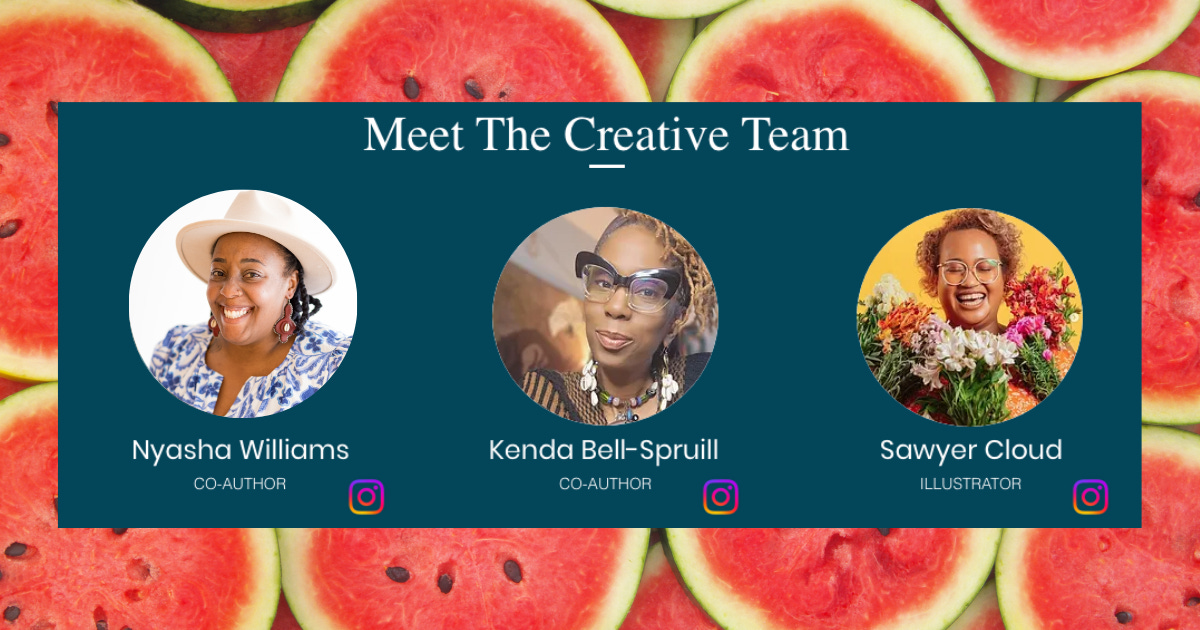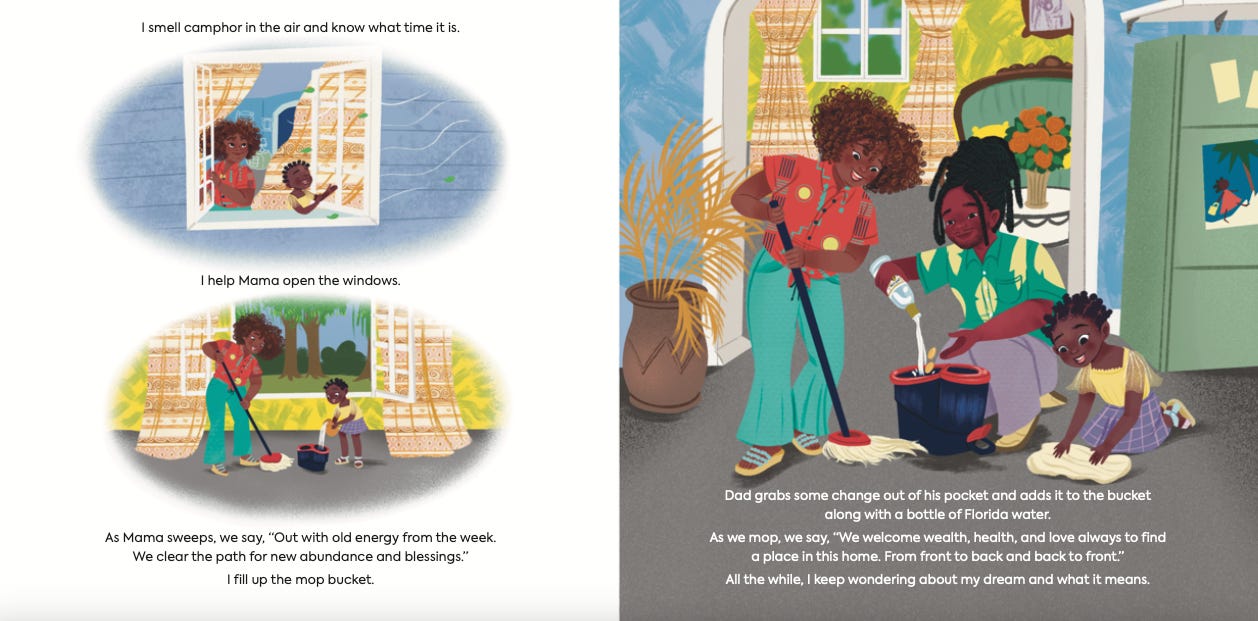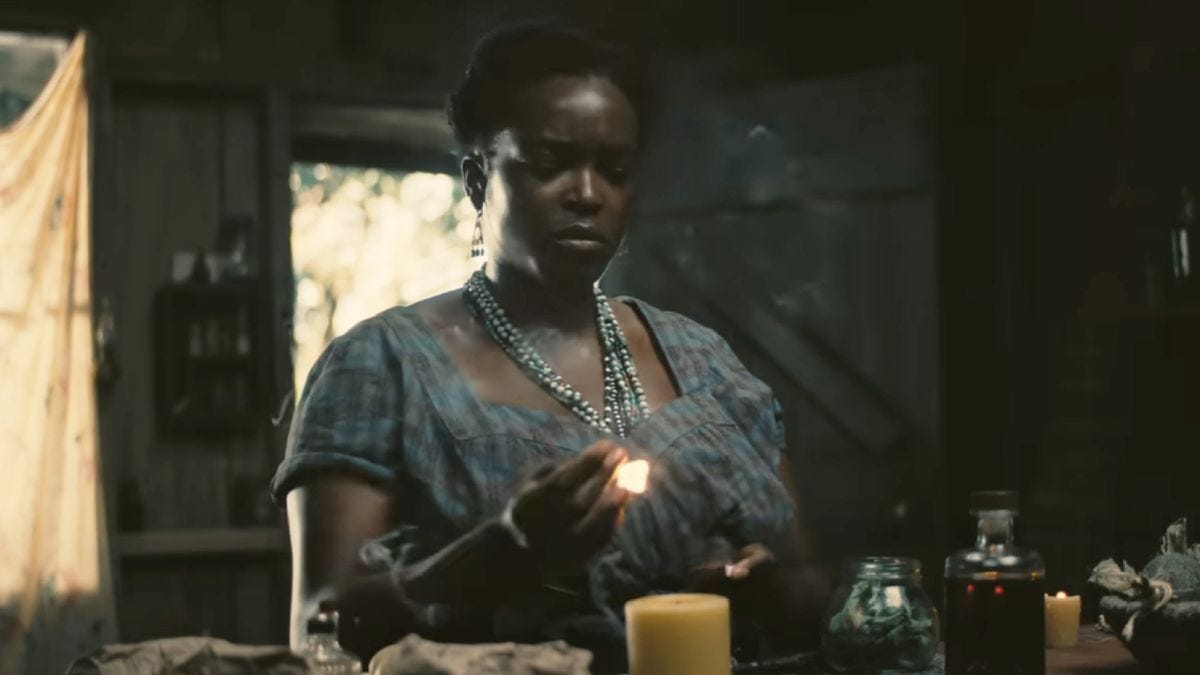The Ancestors Are Always With Us: Hoodoo & Sacred Reclamation in Saturday Magic and Sinners
I feel the Ancestors. I see the Ancestors. I am the Ancestors. The Ancestors are always with me. — Saturday Magic: A Hoodoo Story
After four viewings of the film in theaters, I thought it was about time to share thoughts.
You know something?
Maybe once a week, I wake up paralyzed,
reliving that night.
But before the sun went
down, I think that was the best day
of my life.
Was it like that for you? -SammyNo doubt about it.
Last time I see my brother, I love you.
Last time I seen the sun,
just for a few hours, it was free. -Stack
There’s a scene at the end of Sinners, if you stayed after the first post credit scene, where Sammy says that before the sun went down that day, it was the best day of his life. That moment, stitched together with scenes of the community hanging the signs, cooking, organizing, preparing the juke joint, driving in the car throughout the day - it made my heart ache and swell. That moment is exactly what we need more of: depictions of Black community as magic, as memory, as medicine.
It is a similar portal I hoped to open with Saturday Magic: A Hoodoo Story, a co-authored picture book I wrote with my mother-in-love, Kenda Bell-Spruill. A window into what a real-everyday Hoodoo on a Saturday might look like. Not as horror, not as something to survive or save someone from. But as homecoming. As healing. As joy. It’s an offering to the Diaspora, an everyday ritual of remembrance, and a way to reclaim practices that were once outlawed, hidden in plain sight, or shamed out of us.
I was raised outside of my cultural lineage. I didn’t grow up practicing Hoodoo. I’m a transracial adoptee, raised in a white family where Ancestral veneration wasn’t on conscious radar. My first real encounter with ATRs (African Traditional Religions) came during a college course called Science, Magic, and Religion. I remember being drawn to the distinctions between Hoodoo and Voodoo - noticing how they were often misrepresented or used interchangeably, which they are not. It was a seed planted. I saw how misrepresentation was part of a larger campaign to sever us from what once protected us.
But it wasn’t until my mid-20s, after meeting my husband and beginning my decolonization, indigenization, and liberation work, that I really stepped into this path. That’s when I began unlearning the anti-Blackness I had internalized, started loving Blackness fully, and allowed myself to return to traditions rooted in intuition, community, land, and spirit.
As I wrote in Black Tarot, “My spirituality has developed and evolved through unlearning and learning.” The process isn’t linear. But divination, altar work, dream interpretation…these aren’t foreign to us. They’re familiar. They’re encoded in our DNA.
Saturday Magic is a reflection of that journey of what it means to reclaim ritual, to practice Ancestral veneration openly, and to teach the next generation to do the same.
In the story, every action is sacred. Dayo and her family cleanse with camphor, Florida water, and affirmations. They prepare food for their ancestors. They make offerings of hoecakes and daisies and water. Signs are interpreted: a yellow bird in a dream, an itching palm, coins on one’s path.
Every part of Dayo’s day is a thread in the tapestry of connection. That’s not fiction. That’s tradition.
In Saturday Magic, everything is done with intention:
We sweep with purpose.
We mop with prayers and manifestations.
We offer water, daisies, fruit, ancestor money.
We wear our rose quartz and rub our itching palms without scratching…because we know.
We listen to dreams and trust what they’re trying to tell us.
Dayo, our protagonist, is allowed to be a spiritual detective. She dreams of a yellow bird, and her family gives her space to interpret it for herself. It mirrors my own practice of connecting with my team, my Ancestors, my guides, through dreams, ritual, and divinational tools.
Just like Annie in Sinners.
Watching Annie in Sinners work the root on screen was powerful. She throws bones, crafts mojo bags, reactivates protection tools, uses spiritual colognes and affirmations and intent “The soil of my soil, bone of my bone, blood of my blood, I bless you.” The scene of her pouring over Smoke’s bag? The cleansing? The intention? That’s Hoodoo. That’s Ancestral veneration.
I saw myself in her use of spiritual tools. Tools I’ve created to commune and build relationship with my spiritual team: Black Tarot and Elemental Oracle. Tools I’ve poured intention into for connection, protection, and Ancestral dialogue. I always tell folks: make your own. Our divinational tools are snapshots of who we are at a specific moment in time and creating our own allows spirit to speak in a language only we understand.
These are the same practices I speak about in Black Tarot, where divination is “a skill that takes practice” and requires intention. Where I advise to “Open the window. Light a candle. Speak your intent aloud. Call on your Ancestors by name.” We are always in dialogue with the unseen. Whether through cards, dreams, or yellow birds, spirit responds when we open the line.
I also felt seen in how Sinners prioritized protection and cleansing which is foundational in my practice. Whether through camphor, Florida water, or rose spray, we cleanse our homes, our bodies, our spirits. It’s hygiene. It’s non-negotiable in this work.
What I love most about both Sinners and Saturday Magic is that Hoodoo is framed as something beautiful. Not terrifying. Not demonic. Not a Hollywood gimmick. Just ours.
That scene in Sinners where the Ancestors arrive in the juke joint while Sammy plays? That is the work. It’s what it feels like when you’re in ritual, when your people show up, when you’re surrounded by support. And in that moment, through the music, the crafting, the writing, the creating, the offerings, the energy? The veil is thin. The space becomes sacred, holy and timeless.
The music is its own ritual. I think of my Mother-in-Love blasting gospel on Saturday mornings while cleaning the house. That, too, is portal work.
Other Magic & Messages to Note
Ryan Coogler’s use of vampires in Sinners is brilliant and chilling. These vampires don’t just want our sound (creations, art, writing, craft, spirit), they want to own it. They don’t just want the magic, they want to claim it while banning us from it. That’s the metaphor. Colonization isn’t just a historical event - it’s a hunger. It wants to strip, then mimic. Erase, then trademark. Demonize, then dilute.
That’s why Sinners hits so hard. It’s layered. It’s reflective. And the fact that it came through the pipeline of big studios and publishing houses makes it all the more powerful. It holds up a mirror to the same systems it had to pass through. That’s an Ancestral strategy.
This is about how colonizers have tried for centuries to take our Ancestral gifts (our magic, our music, our food, our knowledge) and ban us from practicing it, shame us for it through religion and media... and then in the next breath, turn around and claim it. Repurpose it. Package it. Market it all back to us.
But here's the truth: they’re not just fascinated, they’re starving. Disconnected from their own Ancestral roots, they’re grasping at the richness that still flows through us. Through our music. Through our rituals. Through our knowing.
Take Sammy’s music. If you know the legacy of the griot, then you know: music, storytelling, writing, poetry, rhythm, that it is all sacred technology. That is a gift passed down. That is memory work. As a griot myself, I don’t write alone. My Ancestors write with me. Spirits join me who are meant to co-create what’s being birthed through me. It’s never just me…it’s always we.
This is what Sinners shows us through metaphor. And it’s what Saturday Magic reclaims through practice.
What is used in relation to the vampires? What Annie does to protect herself and the community? That’s not fantasy. That’s coded Ancestral knowledge.
The mojo bag. The garlic. The wooden stake. The protection bowl. These are metaphors for the spiritual technologies we’ve always used to protect what’s sacred.
They’re signals. Symbols. Reminders.
We can protect ourselves. We have the tools. We are the tools. Hoodoo teaches us that. ATRs teach us that. And Sinners affirms that: that we still have ways of shielding, healing, cleansing, and reclaiming even as everything around us tries to extract and erase.
We are being called to protect our own. Just like the community came together to protect Sammy, we are called to protect our gifts. Our Ancestors. Our spiritual lineages.
Because this isn’t just storytelling. This is spellwork. This is portal-making.
This is truth-telling.
This is how (and why) we venerate.
Honoring Complexity: What I Loved, What Needs Healing
There are pieces of Sinners I adore, and pieces I hold in critique. I love how it centers Annie, yet it also pained me that Smoke didn’t fully trust her spiritual gift until it served his grief. That’s a real dynamic in our communities, a mistrust born from disconnection, colonial Christianity, and generational trauma. Many of us are still unlearning what we were taught to fear. But the shift is coming and happening.
Contrast that with Saturday Magic, where everyone is in it. Mama, Dad, Dayo, even Grandma Rose and Anaya’s two moms - all united in spiritual rhythm. That collective trust and alignment is what we’re moving toward. That’s the future I want to write into being.
Saturday Magic imagines a future and a present where that shift has already happened. Where our children grow up knowing they are supported in their magic and whose wisdom is honored. Where our elders are trusted, mentor and guide. Where our traditions are honored and embraced, not hidden.
And yes, the breastfeeding scene at the end of Sinners moved me. Seeing a Black woman breastfeed a Black child? That’s radical. It shouldn’t be - but it is. And yet, it only happens once she’s crossed over. I want us to have those sacred moments in life, not just in death. That’s why I create stories that celebrate our birthing, our healing, our freedom while we’re still here.
There’s so much I love about Sinners. I’m about to see it for the fourth time. It’s moving the collective. It’s sparking necessary conversations. It’s revolutionary in what it affirms, especially around Hoodoo, Black spirituality, and community magic. So yes ALL THE FLOWERS to Ryan Coogler. Big ones. Because this film is portal-opening.
And - because I love us, I offer this: critique is not cancellation. Critique is care. Accountability is care. And we must be willing to hold both.
Sinners came through a major studio system. That matters. It passed through layers of white approval, executive sign-off, and gatekeeping mechanisms designed to preserve the very systems we’re trying to dismantle: white supremacy, patriarchy, capitalism. So when a project like this makes it through, we have to ask ourselves:
How is it still upholding those systems-intentionally or otherwise?
We need to sit with that. It's complex. Even revolutionary art, when filtered through colonized structures, may be edited, softened, or aligned in ways that make it palatable for the dominant gaze. We’ve seen this happen time and again in publishing and film. So while Sinners is a gift, it’s also a product of a structure. That doesn’t make it void, but it does mean we need to hold it in critical reflection.
We also need to ask: Why does a film that centers Black ancestral joy, creativity, and connection still have to end in trauma and loss?
Why is Sammy the only one who makes it out?
This is a familiar arc in our media joy and magic always tipped into death, chaos, or destruction. What would it look like to simply let us be? Let the community survive? Let the joy expand?
And then there’s the symbolism of the father placing Sammy’s guitar on the church altar,praying over it, speaking intention over it. It’s deep. It echoes the way our gifts are sometimes “saved” by those who deny them publicly but preserve them privately. So much to unpack there.
Again, this isn’t about dismissal. I see my own creative work the same way. Saturday Magic, Black Tarot, this very essay…none of it is above critique. I want folks to reflect, to build on what’s working, and to dream into what’s still missing. That’s how we grow.
My deepest hope is that we continue to open these doors outside the systems. That more of us create through independent presses, through grassroots collectives, through community funding. Because the stories we need are intersectional. They are nuanced. They do not always fit into the molds that keep us tame.
We are multifaceted beings. Our communities are expansive. Our magic is infinite.
So yes, Ryan poured with us forward. He portaled something that had never been done on that scale. And now it's up to us to carry that forward in ways that are even freer. Even braver. Even more rooted in our own definitions of liberation.
Let’s continue to expand the narratives. Let’s build our own tables. Let’s craft stories that reflect the worlds we want to live in.
Ryan, thank you for opening the door.
Now let’s walk through it together and build something new.
A Final Offering
Even with everything that has been stripped from us: language, land, spiritual practice - look at how we still create. Look at the richness we still offer. Watch High on the Hog. Listen to the music on your playlist. Flip through American literature. That’s us. Blackness is the root.
We gave this country its food culture. We gave it jazz, blues, hip hop. We gave it spirituals and protests and poetry. Our community has been the lifeblood of culture, yet we are disrespected, surveilled, erased, and harmed at every turn. That is anti-Blackness. That is the ongoing theft. But it is also a call to remember that we are infinite creators. We are the griots. We are the storytellers, the rootworkers, the keepers of rhythm and memory.
Annie’s storyline in Sinners is one of the most honest depictions of Hoodoo we’ve seen on screen. She doesn’t just do magic - she lives a spiritual rhythm. She cleanses, roots, sets protections, dreams, divines. Watching Sinners, I saw myself. And I saw Saturday Magic. I saw what it means to be fully aligned with your lineage, in joy, rest and resistance.
If you’ve read Saturday Magic or seen Sinners, you’ve been invited into a conversation about Ancestral power. About reclamation. About what it means to remember.
So I leave you with this:
What rituals feel like home to you?
What tools are calling you to be created?
What are you ready to speak life into?
Let’s keep dreaming, divining, and dismantling together.
Let’s portal collectively forward.
With love and intention,
Nyasha
My one favorite songs from the film:



















So beautiful 🥹 Thank you for sharing this. You touched on so many powerful points with such care. I’m also deeply grateful for all the love and intention you pour into your offerings. Saturday Magic has been such a catalyst for me an my daughters spiritual journey. It’s been a beautiful invitation to introduce my daughter to my Hoodoo practice and to find magic in the little everyday moments.
I love when she spots a bird or a coin and says, “Look, Mom, it’s a message from our ancestors,” just like Dayo. Hoodoo is truly so beautiful, and both the movie and Saturday Magic reflect that in such a powerful, thought-provoking way.
For me, ritual that feels like home is as simple as lighting a candle. And lately, Human Design tools have been calling me to bring them to life. I feel ready to speak my authentic truth and heartfelt desires into existence.
While I have not read Saturday Magic and I have only watched Sinners from thinkpieces and social media, I do have both of your decks. This piece released me specifically when you stated beautifully that critique and accountability is care. Thank you so much for that!! I intend to watch Sinners when I'm ready and that's because I need the buzz to quiet down some so I can focus only on what I see and hear.
Also, despite everything being said about the vampires, I still don't like that part of the film's makeup. It just feels completely out of place to ME. I love all the points about just letting us be. As a storyteller from Mississippi myself, I aim with my work to do just that -- let us just live. This is critical to me because it's something we don't see ourselves in cultural productions doing very often and especially when coming from a place that exists in the societal imagination as tragic like Mississippi.
You have brought me so much joy with this piece. Thank you again!!